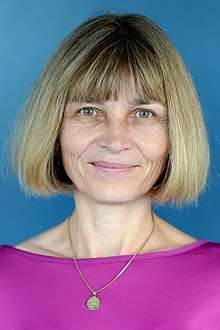Lila Kari
Lila Kari (née Santean) is a Romanian and Canadian computer scientist, professor in the David R. Cheriton School of Computer Science at the University of Waterloo, Canada.
Lila Kari | |
|---|---|
 | |
| Citizenship | Romanian; Canadian |
| Known for | Biocomputing |
| Scientific career | |
| Fields | Computer science |
| Academic advisors | Arto Salomaa |
Biography
Professor Kari earned a master's degree at the University of Bucharest in 1987, studying there with Gheorghe Păun, and then moved to the University of Turku in Finland for her graduate studies, earning a Ph.D. in 1991 under the supervision of Arto Salomaa.[1][2] She came to the University of Western Ontario as a visiting professor in 1993, and by 1996 had been hired there as a tenure-track faculty member.[2][3] In 2017 she accepted a position of professor of computer science and University Research Chair at the University of Waterloo.
Research
Kari's thesis research was in formal language theory. In the mid-1990s, inspired by an article by Leonard Adleman in Science, she shifted her interests to DNA computing.[4] In her research, together with Laura Landweber, she has initiated and explored the study of computational power of DNA processing in ciliates,[5] using her expertise to show that the DNA operations performed by genetic recombination in these organisms are Turing complete.[3] Her more recent research has studied issues of nondeterminism and undecidability in self-assembly,[6] as well as studies of biodiversity informatics, such as proposing alignment-free methods based on Chaos Game Representation of DNA genomic sequences to identify and classify species.[7] [8]
Awards and honors
Kari won the Rolf Nevanlinna doctoral thesis award for the best Finnish mathematics doctoral thesis in 1991.[9] [10] From 2002 to 2011, she held a Canada Research Chair in Biocomputing.[11]
References
- Lila Kari at the Mathematics Genealogy Project
- Biography on the website of the Journal of Universal Computer Science. Retrieved February 22, 2012
- "Biocomputing researcher awarded the Bucke Prize", Western News, University of Western Ontario, March 21, 2002.
- "Careers in Nanobiotechnology: Through the Eyes of a Mathematician", Science Careers, February 2, 2001
- Landweber, Laura; Kari, Lila (1999), "The evolution of cellular computing: Nature's solution to a computational problem", Biosystems, 52 (1–3): 3–13, CiteSeerX 10.1.1.297.3259, doi:10.1016/s0303-2647(99)00027-1.
- Adleman, Leonard; Kari, Jarkko; Kari, Lila; Reishus, Dustin; Sosik, Petr (2009), "The Undecidability of the Infinite Ribbon Problem: Implications for Computing by Self-Assembly.", SIAM J. Comput., 38 (6): 2356–2381, CiteSeerX 10.1.1.158.2098, doi:10.1137/080723971.
- Kari, Lila; Hill, Kathleen; Sayem, Abu; Karamichalis, Rallis; Bryans, Nathaniel; Davis, Katelyn; Dattani, Nikesh (2015), "Mapping the Space of Genomic Signatures", PLoS ONE, 10 (5): e0119815, arXiv:1406.4105, Bibcode:2015PLoSO..1019815K, doi:10.1371/journal.pone.0119815, PMC 4441465, PMID 26000734.
- Karamichalis, Rallis; Kari, Lila; Konstantinidis, Stavros; Kopecki, Steffen (2015), "An investigation into inter- and intragenomic variations of graphic genomic signatures", BMC Bioinformatics, 16: 246, arXiv:1503.00162, Bibcode:2015arXiv150300162K, doi:10.1186/s12859-015-0655-4, PMC 4527362, PMID 26249837.
- "The Rolf Nevanlinna doctoral thesis award". Archived from the original on June 23, 2007. Retrieved February 22, 2012.
- Hamalainen, Anna-Liisa (December 1992), "Tytto joka haluaa kaiken" (PDF), Kodin Kuvalehti (in Finnish): 22–24
- "Canada Research Chairs: Lila Kari". Archived from the original on May 8, 2014. Retrieved February 22, 2012.
External links
- Home page at UWO
- Lila Kari publications indexed by Google Scholar